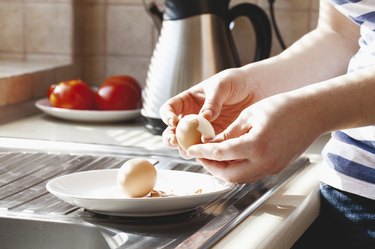
Eating food that's contaminated with pathogens that cause food-borne illness — whether it's eggs, milk or meat — can result in fever, abdominal pain, vomiting and diarrhea (really not fun).
Hard-boiled eggs can be a quick and nutritious snack, but they must be refrigerated and handled properly in order to prevent contamination.
Video of the Day
Video of the Day
Consider the following information and safety tips next time you're wondering how long hard-boiled eggs can sit out. And if you're questioning whether your eggy snack has already gone bad, play it safe and toss it in the trash.
How Long Can Hard-Boiled Eggs Sit Out?
Unrefrigerated hard-boiled eggs can sit out for no more than two hours (or one hour if the temperature outside is 90 degrees Fahrenheit or above), per the USDA.
Hard-boiled eggs (peeled or unpeeled) are safe to eat for a week in the fridge.
Why You Must Refrigerate Hard-Boiled Eggs
Eggs are a nutritional powerhouse, but when left out too long, they carry certain health risks.
Hard-boiled eggs need to be refrigerated, so it's best practice to pop them into the refrigerator after they're boiled.
If hard-boiled eggs are left at room temperature for long periods of time, there's a risk that bacteria can grow at a rapid pace and lead to foodborne illness. Salmonella is one of the most common risks associated with rotten eggs, according to the Food and Drug Administration (FDA).
Salmonella symptoms last between four and seven days, and it can spread through any contaminated food that hasn't been handled properly. In severe cases, salmonella can lead to dehydration and require a trip to the doctor.
Contrary to popular belief, hard-boiled eggs are not safer to leave out than raw eggs.
Even though the salmonella bacteria are killed by heat, hard-boiled eggs can still be susceptible to bacterial infection if undercooked and not stored properly, or if exposed to pathogens and not stored at proper temperatures. This is because the cooking process damages the protective layer on the eggshell, according to the Global Food Consumers' Forum.
Both raw and cooked eggs (and egg products) must be refrigerated.
Tip
In order to keep fresh eggs safe, store them at a temperature of 40 degrees or colder. The same rule applies to hard-boiled eggs, both in and out of the shell.
Bad eggs do not always have a foul odor, so play it safe by practicing proper food safety. Before boiling, throw out any eggs that have cracks or imperfections in the shell, recommends the FDA. Cook eggs until the yolk and white are firm.
If you serve a dish that contains hard-boiled eggs, such as deviled eggs, place your serving platter on ice to keep the eggs cold during service. Set a timer to remind yourself to refrigerate the leftovers within two hours. If your eggs sit out longer than they should, play it safe and throw them out.
Remember: You should discard any perishable foods that have been left at room temperature for longer than two hours (or one hour if the outdoor or room temperature is 90 degrees F or more), per the USDA.
Related Reading